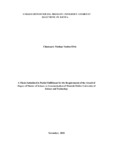Please use this identifier to cite or link to this item:
http://ir-library.mmust.ac.ke:8080/xmlui/handle/123456789/1433| Title: | UTILIZATION OF SOCIAL MEDIA IN UNIVERSITY STUDENTS’ELECTIONS IN KENYA |
| Authors: | Chamegere, Mudogo Nashon Elvis |
| Keywords: | Utilization, Social media, university students, Elections, |
| Issue Date: | 2-Nov-2020 |
| Publisher: | MMUST |
| Abstract: | Several studies have been carried out on the role of social media in political democratization where most of the mbased on national elections in different countries.However,little attention has been given to university students who are increasingly utilizing social media as a way of engaging politically with aspirants, thereby influencing their voting patterns.Therefore,the focus of this study was to assess the utilization of social media in university students elections in Kenya. Specifically, the studysought to: determine the preferred social media tool by university students in Kenya; establish time spent by university students on social media during their communication and examine if social media influences political decisions made by university students during elections in Kenya. Literature review was done to identifythe knowledge gaps and was supported by a conceptual framework based on the variables in the study. The study was underpinned by two theories, namely; Uses and Gratification Theory(Katz, Blumler and Gurevitch,1974)and Framing Theory(Goffman,1974).The Uses and Gratification Theory postulates that the audience usually choose a medium that gratifies their needs while Framing Theory articulates that some aspects of reality are selected by the media and made salient to the public through the choice and design of content posted on social media. The study adopted a descriptive survey research design which involves gathering data that describes events then. Stratified sampling method wasusedfrom a population of 17,000 undergraduate studentsas it guarantees better coverage of the population.Simple random samplingwasthenused to pick respondents from each stratum. Data collection was carried out by use of the questionnaire from a sample of 378students of Masinde Muliro University of Science and Technology. Analysis was done using descriptive statistics that entailedorganizing, tabulating, depicting, and describing the data collected by use of visual aids such as graphs,charts, frequencies and percentages.The findings revealed that social media is vastly used by university students in political communication and determines how the campaigns are carried out. The findings further showedthat there is regular use of social media to express political preferences by political actors and this influences the political decisions made by university students. WhatsApp is the most preferred tool among university students as it allows for easy access, formation of political groupings and information circulation. The study indicates that most students spend time on socialmedia thus the efficacy of its use determines the influence. However, verification of information sent on social media is a barrier in its use in the era of propaganda, disinformation and misinformation. It could be extrapolated that some students endanger their lives and studies by over use of social media, especially the female gender. The study recommends inclusion of social media in university learning system, ensuring university students are versed with the computer misuse and cybercrimes act, 2018, formulation of policies to govern social media use and comprehensive social media strategy in universities. |
| URI: | http://r-library.mmust.ac.ke/123456789/1433 |
| Appears in Collections: | School of Arts and Social Sciences |
Files in This Item:
| File | Description | Size | Format | |
|---|---|---|---|---|
| Elvis Chemagere.pdf | 1.75 MB | Adobe PDF |  View/Open |
Items in DSpace are protected by copyright, with all rights reserved, unless otherwise indicated.
